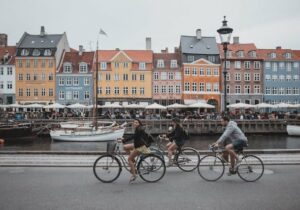More people are moving abroad in search of career growth, better mental health, and a higher quality of life. Whether you’re a remote worker, expat, or job seeker, finding a city with affordable housing, strong infrastructure, and a thriving job market is key.
This guide highlights the best cities to work and live in 2025, based on factors like cost of living, healthcare access, work-life balance, and overall livability:
Top 10 Cities to Work and Live
1. Lisbon, Portugal

Lisbon has become one of Europe’s most attractive destinations for remote professionals, entrepreneurs, and creatives.
Its coastal location, mild climate, and vibrant culture attract international professionals seeking both career growth and quality of life. Lisbon is also home to global offices for companies like Siemens, Mercedes-Benz.io, and Google, which maintains a major tech hub here.
Portugal’s job market is expanding rapidly in tech, tourism, and green energy. The city has become a magnet for startups, with international events like Web Summit fueling its reputation as a fast-growing tech ecosystem.
Lisbon ranks among the top global cities for quality of life, according to the Global Intelligence Unit, with high marks for safety, healthcare, and access to essential services. The city combines a low cost of living with a high standard of living. Numbeo places it at 48.4 in its 2025 index, making it one of the most affordable capitals in Western Europe, especially in terms of housing.
Portugal’s labor laws support a healthy work-life rhythm, offering 22 days of paid vacation annually in addition to 13 public holidays. The national culture also encourages extended meal breaks and a relaxed daily tempo. Healthcare is strong and widely accessible through both public and private systems.
Lisbon’s appeal to remote workers is further reinforced by its ranking in Global Intelligence Unit’s Global Digital Nomad Report, thanks to its visa flexibility, affordability, and strong lifestyle offering. The Portugal Golden Visa or Portugal Digital Nomad Visa offers great opportunities for expats to make Portugal their home.
|
Quality of life
|
Coastal beauty, low crime, inclusive communities and a relaxed pace of life. |
|
Economic opportunities
|
Remote-friendly startup culture and a growing digital ecosystem. |
|
Cost of living
|
Low and affordable in comparison to other Western European capitals, excellent for expats and job seekers alike. |
|
Work-life balance
|
Mediterranean lifestyle encourages downtime and community. |
|
Infrastructure
|
Good public services, digital connectivity, and healthcare. |
|
Average salary
|
€2,215 per month/€26,580 annually |
2. Madrid, Spain

Madrid combines cosmopolitan energy with long-standing cultural traditions, making it a vibrant capital for both living and working.
As Spain’s economic center, it’s a hub for finance, tech, and education, with major companies like BBVA, Accenture, Amazon, and IBM maintaining a strong presence. The city’s infrastructure, lifestyle, and expanding digital economy make it a magnet for professionals and expats seeking both career growth and community.
Spain’s job market in Madrid is especially strong in banking, fintech, e-learning, and health tech—sectors that have shown resilient growth post-pandemic.
Frequently ranked among the best European cities for digital nomads, Madrid combines strong infrastructure with a dynamic social and professional scene. In fact, the Spain Digital Nomad Visa is one of the few in Europe that offers a direct path to citizenship for time spent in Spain as a remote worker.
Madrid ranks favorably for overall livability, with excellent public healthcare, an extensive metro system, and a vibrant cultural calendar. According to Numbeo’s statistics, its Cost of Living sits at 55.9, making it more affordable than many Western European capitals. For example, the cost of living in Madrid is 49.1% cheaper than in London, United Kingdom.
Spain offers 30 calendar days of paid vacation, one of the most generous PTO packages in Europe, supporting a work culture that prioritizes personal time and family connection. Healthcare access is broad through both public and private systems.
Spain also performs well on safety indicators. According to the Global Intelligence Unit, Spain ranks as the 8th safest country in Europe in 2023 for violent crime. While pickpocketing can occur in crowded areas, the country’s homicide rate of 0.64 per 100,000 remains well below the EU average, making Madrid a secure and stable environment for expats and professionals alike.
|
Quality of life
|
Dynamic food, arts, and nightlife scene. Safe and welcoming for expats. |
|
Economic opportunities
|
Diverse job market in education, tech, and financial services. |
|
Cost of living
|
Moderate housing and transportation costs. Excellent public services. |
|
Work-life balance
|
Long lunches and social traditions encourage downtime. |
|
Infrastructure
|
Clean, punctual transit system and access to universal healthcare. |
|
Average salary
|
€2,282 per month/€27,384 annually |
3. Geneva, Switzerland

Geneva offers one of the highest standards of living globally, making it a top choice for professionals seeking long-term stability, international experience, and personal well-being.
Situated in the heart of Europe and surrounded by the Alps, Geneva serves as a center for diplomacy and humanitarian work. It hosts the European headquarters of the United Nations, World Health Organization, International Committee of the Red Cross, and over 180 other international bodies, making it an ideal destination for those working in global policy, health, and human rights.
The job market is also strong in finance, legal services, and scientific research, with Swiss banks and multinationals like Pictet Group and DuPont offering high-level career opportunities. Average gross salaries in Geneva exceed CHF 7,770 (around €8,000) per month which is significantly higher than most major European capitals. These high wages are reflected in exceptional public services, world-class healthcare, and extensive public transportation.
While living expenses are among the highest in Europe, Geneva consistently ranks at the top of global quality of life indexes. Switzerland is one of Europe’s best countries to live in for expats, praised for its stability, healthcare, and environmental performance. The Global Peace Index 2024 ranks Switzerland among the world’s 10 safest countries, while Transparency International regularly scores it as one of the least corrupt countries globally.
Swiss labor law also supports a strong work-life balance, with most professionals receiving 25+ days of paid vacation, flexible hours, and strong job protections. The healthcare system is one of the best in the world, offering universal access through mandatory insurance.
Geneva’s safety, clean air, access to nature, and multicultural environment make it particularly attractive for expats, diplomats, and families. Whether you’re working in global governance or high finance, Geneva delivers unmatched professional credibility and a lifestyle rooted in security, health, and international community.
|
Quality of life
|
Clean, safe, scenic city with high environmental standards and outdoor access. |
|
Economic opportunities
|
Strong job market in finance, diplomacy, and home to many global NGOs. |
|
Cost of living
|
Very high, particularly housing and dining, but matched by high salaries. |
|
Work-life balance
|
Structured work culture with generous vacation policies and strong labor protections. |
|
Infrastructure
|
Top-tier healthcare and public services; excellent connectivity. |
|
Average salary
|
€7,944 per month/€95,328 annually |
4. Prague, Czech Republic

Prague offers a rare mix of affordability, safety, and a flourishing urban economy.
The Czech capital has quietly become a leading destination for professionals in IT, engineering, and e-commerce, attracting international companies and startups alike. Its walkability, strong public services, and preserved historic charm make it especially appealing to those seeking a more balanced and cost-effective European lifestyle.
The city is a growing center for IT, e-commerce, engineering, and shared services, attracting global firms such as SAP, Amazon, and Accenture. Unemployment remains low at 3% (one of three European countries with the lowest rates), and the capital is a draw for international talent thanks to its business-friendly environment and expanding startup support programs.
Living costs are considerably lower than in Western Europe, with affordable rent, food, and transportation options. Despite its cost-effectiveness, Prague offers efficient public healthcare, reliable infrastructure, and a growing network of international schools. The average monthly salary is modest by Western European standards but goes further due to reduced day-to-day expenses.
Employees are entitled to a minimum of 20 paid vacation days, with shorter average work hours and high levels of job flexibility in the tech and services sectors. Healthcare coverage is universal, and access to psychological support is improving through employer programs and regional clinics.
With its walkable layout, historical beauty, and fast-growing industries, Prague remains a top choice for remote workers, expats, and young professionals seeking a cost-effective yet vibrant European base.
|
Quality of life
|
Historic charm, arts scene, and good air quality in a walkable city. |
|
Economic opportunities
|
Growing job market in IT, tourism, and education. |
|
Cost of living
|
Highly affordable housing and services for a capital city. |
|
Work-life balance
|
Increasingly flexible work culture, especially in tech and startups. |
|
Infrastructure
|
Efficient public transit and access to quality healthcare. |
|
Average salary
|
€2,228 per month/€26,742 annually |
5. Dublin, Ireland

Dublin stands out as one of the fastest-growing economies in the European Union. This vibrant city played a vital role in Ireland’s strong 1.2% GDP growth in 2024 and is predicted to continue doing so in years to come.
With major tech, pharmaceutical, and finance firms headquartered in the city, including Google, Meta, Amazon, and Pfizer, Dublin has established itself as a thriving European innovation hub. This has created a dynamic and resilient job market, especially for professionals in IT, digital services, fintech, and life sciences.
Wages are among the highest in the EU, helping to balance Dublin’s relatively high housing costs. According to Eurostat, Irish housing costs in 2023 were 101% above the EU average with many houses costing around €400,000 with rental prices being even higher.
The city supports a strong work-life balance, offering a minimum of 20 paid vacation days, with many companies providing 25 or more, plus nine public holidays. Dublin also benefits from solid healthcare infrastructure and growing access to mental health services.
The city is frequently ranked for its high livability, safety, and vibrant international community. It’s one of Europe’s best countries to live in for expats, particularly those in tech or entrepreneurship. For those looking to launch a business, the Ireland Startup Entrepreneur Visa provides a pathway to residence for non-EU nationals with high-potential startups.
|
Quality of life
|
Modern and multicultural city with a vibrant social scene. |
|
Economic opportunities
|
Leading tech and finance hub (European HQ for many tech giants) and great for career growth. |
|
Cost of living
|
High housing prices, but balanced by strong wages and services. |
|
Work-life balance
|
Evolving work culture with emphasis on social connection and community. |
|
Infrastructure
|
Solid education, public transport, and expanding healthcare services. |
|
Average salary
|
€4,600 per month/€55,000 annually |
6. Calgary, Canada

Calgary stands out in North America for its combination of economic opportunity, access to nature, and family-friendly amenities. Situated in Alberta’s energy-rich region, it’s a growing hub for innovation in tech, engineering, and finance.
The city is also known for its affordability, short commutes, and strong sense of community, factors that continue to draw skilled professionals from across Canada and abroad.
With a Quality of Life Index of 176.3 and a Purchasing Power Index of 119.0, Calgary ranks among the top global cities for livability and affordability. Alberta’s economy is forecast to grow by 2.8% in 2025, outpacing the national average, driven by continued investment in clean energy, technology, and infrastructure.
Professionals enjoy reliable access to public healthcare and well-funded education systems. Workers receive two to three weeks of paid leave, plus up to ten statutory holidays annually. Commute times are short by North American standards, and the city’s proximity to the Rocky Mountains offers abundant outdoor activities that encourage a balanced lifestyle.
Housing remains accessible, with living costs 37% lower than in New York City and rent 67% cheaper. Calgary also maintains a relatively low crime severity index, and Canada as a whole consistently ranks among the world’s most peaceful and transparent nations.
Culturally, Calgary shines through events like the Calgary Stampede, which contributes roughly CA$450 million to the local economy each year. Whether you’re raising a family or launching a career, Calgary provides a high-functioning, welcoming environment with room to grow.
|
Quality of life
|
Safe, nature-rich city with clean air quality and high liveability. |
|
Economic opportunities
|
Strong job market in energy, engineering, and tech. |
|
Cost of living
|
More affordable housing compared to other major cities in Canada. |
|
Work-life balance
|
Excellent, with outdoor recreation easily accessible. |
|
Infrastructure
|
Reliable healthcare, education, and transit systems. |
|
Average salary
|
$4,853 per month/$58,243 annually |
7. Singapore City, Singapore

Singapore is one of Asia’s most sought-after cities for ambitious professionals, thanks to its advanced infrastructure, high earning potential, and strong international connectivity.
The average gross salary sits at S$5,783 per month, it is a country with no capital gains tax and low personal income tax that is capped at 22%. This makes it a popular choice for executives, entrepreneurs, and regional HQ teams.
Despite higher property prices, day-to-day living is efficient and streamlined. Public transportation is among the most reliable in the world, and health services (both public and private) are fast and high quality. In recent years, there has also been a nationwide push to expand access to emotional well-being services, with a 30% increase in licensed professionals.
Singapore consistently ranks among the world’s safest cities, with a homicide rate of just 0.2 per 100,000 and strong public trust in institutions. Workers receive at least 14 days of annual leave, though many sectors offer more. Its fast, secure digital infrastructure and business-friendly regulations also make it a strategic base for location-independent professionals and regional teams.
|
Quality of life
|
Efficient, ultramodern, and globally connected city. |
|
Economic opportunities
|
High-demand job market in finance, biotech, and tech. |
|
Cost of living
|
Expensive, especially housing and schooling, but offset by high income. |
|
Work-life balance
|
Expats report that while wages are excellent, there is unfortunately little leisure time. |
|
Infrastructure
|
World-class public transport, healthcare, and digital connectivity. |
|
Average salary
|
S$5,783 per month/S$69,396 annually |
8. Copenhagen, Denmark

Copenhagen combines Nordic functionality with an open, inclusive culture that appeals to creatives, researchers, and sustainability professionals.
The average monthly wage is around DKK 45,000 (€6,000), and while tax rates are high, they fund an outstanding standard of living which is reflected in Denmark’s consistent top rankings for happiness and trust.
The city has emerged as a leader in green energy, pharmaceuticals, and design innovation, with major firms like Novo Nordisk and Ørsted headquartered here. Most full-time employees enjoy five weeks of paid vacation, generous family leave policies, and a 37-hour standard workweek, which are elements that strongly support personal balance and downtime.
Public healthcare is fully funded, and psychological support is widely accessible through regional health centers. Safety is also a defining feature with Denmark ranking among the most peaceful nations globally. Copenhagen remains one of the most secure capitals in Europe. For those seeking a walkable, climate-conscious city that prioritizes quality of life, Copenhagen remains a top contender.
|
Quality of life
|
High quality of life with a focus on sustainability and community. |
|
Economic opportunities
|
Strong job market in green tech, pharmaceuticals, and design. |
|
Cost of living
|
High, but balanced by free healthcare, education, and social benefits. |
|
Work-life balance
|
Outstanding, with 37-hour workweeks and generous family leave. |
|
Infrastructure
|
Efficient public services, bike lanes, and universal healthcare. |
|
Average salary
|
$6,970 per month/$83,640 annually |
9. Berlin, Germany

Berlin offers a unique mix of cultural freedom, affordability, and professional opportunity. With average salaries at €4,580 per month, and a housing price-to-income ratio of 7.8, the city is relatively accessible compared to other Western European capitals.
Its economy thrives in startups, media, tech, and sustainable innovation, and it’s a magnet for entrepreneurs and international professionals alike.
The city also benefits from robust labor protections, with 20 to 30 days of paid leave, public holidays, and strong employee rights baked into federal law.
Public transport is reliable and affordable, and the healthcare system covers both physical and emotional services through state-backed insurance. Berlin also ranks highly for civil liberties, diversity, and safety, offering an environment where professionals and creatives alike can thrive without the pressure of excessive costs or rigid hierarchies.
|
Quality of life
|
Culturally rich, diverse, and progressive with good air quality. |
|
Economic opportunities
|
Strong job market in tech, startups, media, and the arts. |
|
Cost of living
|
Still relatively affordable housing, especially outside central areas. |
|
Work-life balance
|
Good labor protections and social benefits encourage well being. |
|
Infrastructure
|
Efficient transport, free university education, and strong healthcare. |
|
Average salary
|
€4,580 per month/€55,000 annually |
10. Austin, Texas, USA

Austin has emerged as one of the most dynamic U.S. cities for remote workers, founders, and tech specialists. Average earnings reach $6,234 per month, and Texas’s lack of state income tax means take-home pay goes further, especially compared to cities like San Francisco or New York.
Many professionals are moving to this state and Austin in particular. This trek is powered by the presence of major employers such as Tesla, Apple, Dell, and Oracle, alongside hundreds of high-growth startups. Austin’s annual GDP growth has hovered around 4.5%, well above national averages.
Residents enjoy more than 220 city parks, year-round sunshine, and a vibrant cultural and live music scene. Most employers offer 10 to 15 vacation days, with flexible work arrangements common in the tech and creative sectors. Healthcare is private but high standard, and access to mental and emotional health care is steadily improving through employer-sponsored plans.
With its entrepreneurial spirit, diverse neighborhoods, and casual yet driven culture, Austin appeals to those who want access to opportunity without sacrificing lifestyle.
|
Quality of life
|
Laid-back with access to the great outdoors and, vibrant music and culture scene. |
|
Economic opportunities
|
Fast-growing job market in tech, healthcare, and startups. |
|
Cost of living
|
More affordable housing than coastal U.S. cities, though rising. |
|
Work-life balance
|
Relaxed work environment with emphasis on creativity and personal time. |
|
Infrastructure
|
Expanding public transit and bike infrastructure. |
|
Average salary
|
$6,234 per month/$74,818 annually |